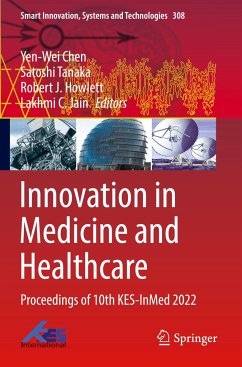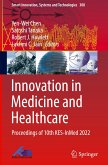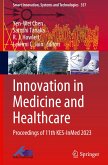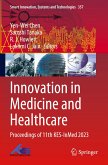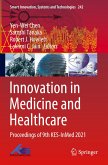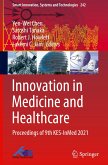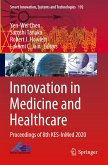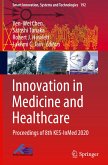Innovation in Medicine and Healthcare
Proceedings of 10th KES-InMed 2022
Herausgegeben:Chen, Yen-Wei; Tanaka, Satoshi; Howlett, Robert J.; Jain, Lakhmi C.
Innovation in Medicine and Healthcare
Proceedings of 10th KES-InMed 2022
Herausgegeben:Chen, Yen-Wei; Tanaka, Satoshi; Howlett, Robert J.; Jain, Lakhmi C.
- Broschiertes Buch
- Merkliste
- Auf die Merkliste
- Bewerten Bewerten
- Teilen
- Produkt teilen
- Produkterinnerung
- Produkterinnerung
This book presents the proceedings of the KES International Conferences on Innovation in Medicine and Healthcare (KES-InMed-22), held in Rhodes, Greece, on June 20-22, 2022. Covering a number of key areas, including digital IT architecture in health care; advanced ICT for medicine and health care; biomedical engineering, trends, research, and technologies; and healthcare support systems, this book is a valuable resource for researchers, managers, industrialists, and anyone wishing to gain an overview of the latest research in these fields.
Andere Kunden interessierten sich auch für
![Innovation in Medicine and Healthcare Innovation in Medicine and Healthcare]() Innovation in Medicine and Healthcare193,99 €
Innovation in Medicine and Healthcare193,99 €![Innovation in Medicine and Healthcare Innovation in Medicine and Healthcare]() Innovation in Medicine and Healthcare193,99 €
Innovation in Medicine and Healthcare193,99 €![Innovation in Medicine and Healthcare Innovation in Medicine and Healthcare]() Innovation in Medicine and Healthcare193,99 €
Innovation in Medicine and Healthcare193,99 €![Innovation in Medicine and Healthcare Innovation in Medicine and Healthcare]() Innovation in Medicine and Healthcare154,99 €
Innovation in Medicine and Healthcare154,99 €![Innovation in Medicine and Healthcare Innovation in Medicine and Healthcare]() Innovation in Medicine and Healthcare154,99 €
Innovation in Medicine and Healthcare154,99 €![Innovation in Medicine and Healthcare Innovation in Medicine and Healthcare]() Innovation in Medicine and Healthcare154,99 €
Innovation in Medicine and Healthcare154,99 €![Innovation in Medicine and Healthcare Innovation in Medicine and Healthcare]() Innovation in Medicine and Healthcare154,99 €
Innovation in Medicine and Healthcare154,99 €-
-
-
This book presents the proceedings of the KES International Conferences on Innovation in Medicine and Healthcare (KES-InMed-22), held in Rhodes, Greece, on June 20-22, 2022. Covering a number of key areas, including digital IT architecture in health care; advanced ICT for medicine and health care; biomedical engineering, trends, research, and technologies; and healthcare support systems, this book is a valuable resource for researchers, managers, industrialists, and anyone wishing to gain an overview of the latest research in these fields.
Produktdetails
- Produktdetails
- Smart Innovation, Systems and Technologies 308
- Verlag: Springer / Springer Nature Singapore / Springer, Berlin
- Artikelnr. des Verlages: 978-981-19-3442-1
- 1st edition 2022
- Seitenzahl: 332
- Erscheinungstermin: 7. Juli 2023
- Englisch
- Abmessung: 235mm x 155mm x 17mm
- Gewicht: 565g
- ISBN-13: 9789811934421
- ISBN-10: 9811934428
- Artikelnr.: 68192515
- Herstellerkennzeichnung Die Herstellerinformationen sind derzeit nicht verfügbar.
- Smart Innovation, Systems and Technologies 308
- Verlag: Springer / Springer Nature Singapore / Springer, Berlin
- Artikelnr. des Verlages: 978-981-19-3442-1
- 1st edition 2022
- Seitenzahl: 332
- Erscheinungstermin: 7. Juli 2023
- Englisch
- Abmessung: 235mm x 155mm x 17mm
- Gewicht: 565g
- ISBN-13: 9789811934421
- ISBN-10: 9811934428
- Artikelnr.: 68192515
- Herstellerkennzeichnung Die Herstellerinformationen sind derzeit nicht verfügbar.
Prof. Yen-Wei Chen received his B.E. degree in 1985 from Kobe University, Kobe, Japan. He received his M.E. degree in 1987 and his D.E. degree in 1990, both from Osaka University, Osaka, Japan. He was Research Fellow at the Institute of Laser Technology, Osaka, from 1991 to 1994. From October 1994 to March 2004, he was Associate Professor and Professor in the Department of Electrical and Electronic Engineering, University of the Ryukyus, Okinawa, Japan. He is currently Professor at the College of Information Science and Engineering, Ritsumeikan University, Kyoto, Japan. He is also a Visiting Professor at the College of Computer Science and Technology, Zhejiang University, Hangzhou, China. He was Visiting Scholar at Oxford University, Oxford, UK, in 2003 and at Pennsylvania State University, Pennsylvania, USA, in 2010. His research interests include medical image analysis and pattern recognition. He has published more than 300 research papers. He has received many distinguished awards including Best Scientific Paper Award of ICPR2013 and Outstanding Chinese Oversea Scholar Fund of Chinese Academy of Science. Prof. Satoshi Tanaka got his Ph.D. in theoretical physics at Waseda University, Japan, in 1987. After being experienced as Assistant Professor, Senior Lecturer, and Associate Professor at Waseda University and Fukui University, he became Professor of Ritsumeikan University in 2002. His current research target is computer visualization of complex 3D shapes such as 3D scanned cultural heritage objects, inside structures of a human body, and fluid simulation results. Recently, he was President of JSST (Japan Society for Simulation Technology), President of ASIASIM (the Federation of Asia Simulation Societies), and Vice President of the VSJ (Visualization Society of Japan). Currently, he is working as Cooperation Member of Japan Science Council. He is the best paper winners at Asia Simulation Conference 2012,Journal of Advanced Simulation in Science and Engineering in 2014, and many others. Prof. Robert Howlett is the Academic Chair of KES International, a non-profit organization that facilitates knowledge transfer and the dissemination of research results in areas including Intelligent Systems, Sustainability, and Knowledge Transfer. He is a Visiting Professor at 'Aurel Vlaciu' University of Arad in Romania. His technical expertise is in the use of intelligent systems to solve industrial problems. He has been successful in applying artificial intelligence, machine learning and related technologies to sustainability and renewable energy systems; condition monitoring, diagnostic tools and systems; and automotive electronics and engine management systems. His current research work is focused on the use of smart microgrids to achieve reduced energy costs and lower carbon emissions in areas such as housing and protected horticulture. Prof. Lakhmi C. Jain, PhD, Dr H.C., ME, BE(Hons), Fellow (Engineers Australia), is with the Liverpool Hope University and the University of Arad. He was formerly with the University of Technology Sydney, the University of Canberra and Bournemouth University. Professor Jain founded the KES International for providing a professional community the opportunities for publications, knowledge exchange, cooperation and teaming. Involving around 5,000 researchers drawn from universities and companies world-wide, KES facilitates international cooperation and generate synergy in teaching and research. KES regularly provides networking opportunities for professional community through one of the largest conferences of its kind in the area of KES.
3D Convolutional Neural Network for Covid Assessment on CT Scans.- Prediction Models for COVID-19 in Children.- Society 5.0 as Digital Strategy for Scalability: Tamba's COVID-19 Vaccination Management System and its Expansion.- Analysis of Ensemble Learning for Chest X-Ray Images.- Adaptive Multi-Omics Survival Analysis in Cancer.- Risk Analysis of Developing Lifestyle-related Diseases based on the Content of Social Networking Service Posts.- Digital Twin in Healthcare through the Eyes of the Vitruvian Man.- Relationship between Mental Health, Life Skills and Life Satisfaction among Japanese Athletes.- IT Assisted Gardening for the Revitalization of the Elderly: The Turntable Solution.- Mental Health of the Elderly: Towards a Proposal for a Social Simulator based on the Complexity Approach.
3D Convolutional Neural Network for Covid Assessment on CT Scans.- Prediction Models for COVID-19 in Children.- Society 5.0 as Digital Strategy for Scalability: Tamba's COVID-19 Vaccination Management System and its Expansion.- Analysis of Ensemble Learning for Chest X-Ray Images.- Adaptive Multi-Omics Survival Analysis in Cancer.- Risk Analysis of Developing Lifestyle-related Diseases based on the Content of Social Networking Service Posts.- Digital Twin in Healthcare through the Eyes of the Vitruvian Man.- Relationship between Mental Health, Life Skills and Life Satisfaction among Japanese Athletes.- IT Assisted Gardening for the Revitalization of the Elderly: The Turntable Solution.- Mental Health of the Elderly: Towards a Proposal for a Social Simulator based on the Complexity Approach.

